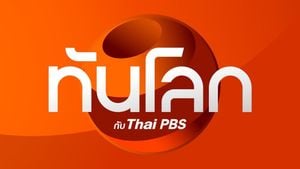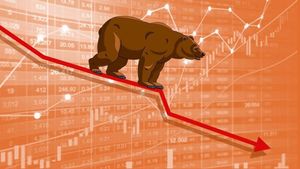The Arab world is witnessing significant economic developments as countries position themselves for growth through technological advancements and enhanced trading relationships. Recent observations from the Tanah Abang market—a major retail hub based in Jakarta—illustrate a vibrant pre-Ramadan shopping season, reflecting increasing commercial activity.
With the approach of Ramadan this year, the Tanah Abang market has become more crowded, with vendors like Sukma, who has sold goods there for over three decades, reporting noticeable increases in both foot traffic and sales. "Every year is busy when it approaches fasting. But this year feels busier than last year. Thank God, business volume has also increased," Sukma shared, indicating optimism about the season. The assorted goods sought by shoppers range from clothing to religious items, showcasing the cultural significance of Ramadan and the economic vibrancy it brings.
According to reports, trading at the market is not just confined to local shoppers; it attracts merchants from across Indonesia seeking attractive wholesale prices. Rozik, another trader who frequently buys goods from Tanah Abang to sell elsewhere, stated, "If you are looking for new goods and competitive prices, you must be here. I have long purchased here and never moved to other markets." This dynamic highlights Tanah Abang's central role in Indonesia's retail trade.
Meanwhile, the broader Arab world is sprinting toward modernization through digital and technological advances. Ahmed Aboul Gheit, the Secretary General of the Arab League, recently praised Saudi Arabia and the United Arab Emirates for their strides within the artificial intelligence arena. He remarked, "Some Arab countries have made significant progress over the past few years on digital transformation, strengthening their ability to engage with global challenges. Notably, Saudi Arabia and the UAE have made it to the list of the top 20 countries according to the global artificial intelligence index."
At the Digital Cooperation and Development Forum held recently, Aboul Gheit urged Arab nations to prioritize digital strategies and collaboration, cautioning against the insufficient investment levels for research and development within the technology sector across the region. He added, "The challenges we face today also present opportunities to strengthen cooperation and align the Arab region to its rightful place. Our digital agenda can ease the path to sustainable growth and innovation."
Conversations about trade and mutual support extend beyond tech advancements as evidenced by recent diplomatic exchanges between Egypt and Chad. Badr Abdelatt thei, Egypt's Minister of Foreign Affairs, highlighted the importance of reinforcing bilateral relationships, aiming to increase economic cooperation and trade. During their discussions, he stated, "We look forward to increasing cooperation and coordination on various issues," affirming the mutual benefits of strengthening trade ties.
The narratives from busy markets and diplomatic discussions serve as touchstones for the significant shifts happening within the Arab world—a region determined to leverage its resources and potential for economic growth and technological advancement. With the Ramadan shopping season reinforcing economic vitality and initiatives like those spearheaded by Aboul Gheit encouraging cooperation across Arab nations, there is palpable momentum toward realizing the Arab nations' developmental goals.
Looking forward, the region's commitment to enhancing its technological infrastructure and collaborative efforts holds the promise of positioning the Arab world effectively on the global stage. The combination of tradition, like the festive commercial activities leading up to Ramadan, and modern economic strategies exemplifies the dynamic transformations shaping the Arab economic future.



